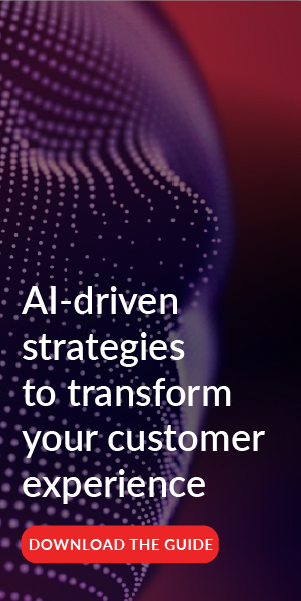Topics
Ethical AI in BPO: How We’re Balancing Automation with Human Connection

In an era where algorithms are handling more customer interactions from start to finish, how do you preserve empathy, trust, and the human connection?
In today's business world, it's a question many companies are struggling to answer. AI is here to stay and is quickly transforming customer service, sales, onboarding, and even emotional support. In fact, a recent Gartner study predicts that by 2026, one in ten agent interactions will be automated, fundamentally shifting the customer experience. But what happens when speed and automation threaten to silence empathy?
At CGS, this isn't a hypothetical question — it's a responsibility. We've made a conscious decision: AI should enhance people, not replace them. In this article, I’ll explore how we’re walking the line between efficiency and ethics — and why that choice may be our most powerful innovation yet.
Smart tech, kinder touch: the human-AI balance
Picture this: a customer calls in, visibly frustrated. They've been charged twice. They don’t understand the invoice. They’re ready to cancel their service. Now imagine an AI assistant picks up, identifies the issue, and offers a quick fix.
Today’s emotional AI can detect some sentiment cues such as the stress in someone’s voice or agitation and even respond with greater empathy. That said – nuance can often still be a blind spot. The deeper context, the unspoken worries, the human complexity behind the frustration: that’s exactly why human connection still matters.
We’ve long recognized this truth, which is why we adopted a hybrid customer support model. Ours blends AI for repetitive tasks with skilled human agents trained to handle emotionally charged or complex conversations. For example, we implemented an AI-powered system for a major telecommunications client to manage routine account balance inquiries and password resets — freeing up our agents to focus on nuanced, high-stakes issues, like resolving billing disputes or addressing prolonged service outages.
The results speak for themselves: we saw a 94% drop in abandoned calls and a 34% increase in customer satisfaction. These aren't just metrics — they’re proof that even the best technology still needs a heartbeat behind it.
Ethics first, always
Let’s face it — AI in customer service can feel cold, impersonal, even risky. Concerns about privacy, algorithmic bias, and job displacement are real. That’s why we’ve taken a proactive approach by implementing internal AI governance frameworks. These frameworks prioritize transparency, security, and fairness.
Every AI project we undertake is subject to ethical review, not just technical testing. Data privacy is non-negotiable, and our models are trained on clean, compliant datasets. We also ensure transparency — customers are informed when they’re interacting with AI, and when a situation calls for human help, escalation happens instantly. Our North Star is clear: AI should never compromise trust.
Empowering people, not replacing them
While some companies are downsizing staff in favor of automation, we’re doubling down on our people. Our goal is to create the ‘AI-ready agent’ — professionals who don’t just tolerate technology but thrive with it.
We’re using proprietary CGS solutions like Cicero, lifelike AI-powered roleplay, for training simulations that prepare agents for real-world challenges. One standout program — developed for a global retail client — simulates tense customer interactions during the holiday season, teaching agents to manage tone, emotion, and de-escalation using AI-driven feedback.
Think of it as a flight simulator for empathy: powered by AI but grounded in human experience. These immersive scenarios sharpen agent skills, blending authenticity with AI insight — ensuring that the tech supports the conversation, not controls it. The outcome? A workforce that’s faster, smarter, and more emotionally aware.
From ethical stance to competitive advantage
Ethical AI isn’t just a moral imperative — it’s smart business. AI excels at speeding up transactions and even assisting with complex queries — but resolving emotionally charged issues like a billing dispute often requires human empathy and judgment. In fact, a 2023 Zendesk report revealed that nearly 70% of consumers still want a human agent for complex issues.
Our clients — from global retailers to telecom leaders — are seeing the results. But perhaps the bigger shift is internal. At CGS, our teams aren’t intimidated by AI; they’re energized by it. That mindset — from fear to fluency — sets us apart in the BPO space.
Future-ready, human-first
PwC found that one in three customers will abandon a brand after a single bad experience. That makes every interaction, human and AI, count — especially the ones that require understanding, not just service. AI will only continue to evolve — growing more responsive, more predictive, even more human-like. But the key question for brands and their BPO partners is this: will that evolution enhance the human experience — or replace it?
At CGS, we’re betting on more human. For us, ethical AI isn’t a limitation — it’s a launchpad. It’s what lets us scale faster without losing the very thing that matters most: trust, empathy, and real human connection. This isn’t a battle between people and machines. It’s a partnership — and we’re showing what that future can look like: smarter, fairer, and unmistakably human.
Want to learn how we can help your business strike the right balance between AI and empathy? Reach out to us today — we’d love to start the conversation.

